TIZ 4. Slumil K’ajxemk’op (Rebel Land)
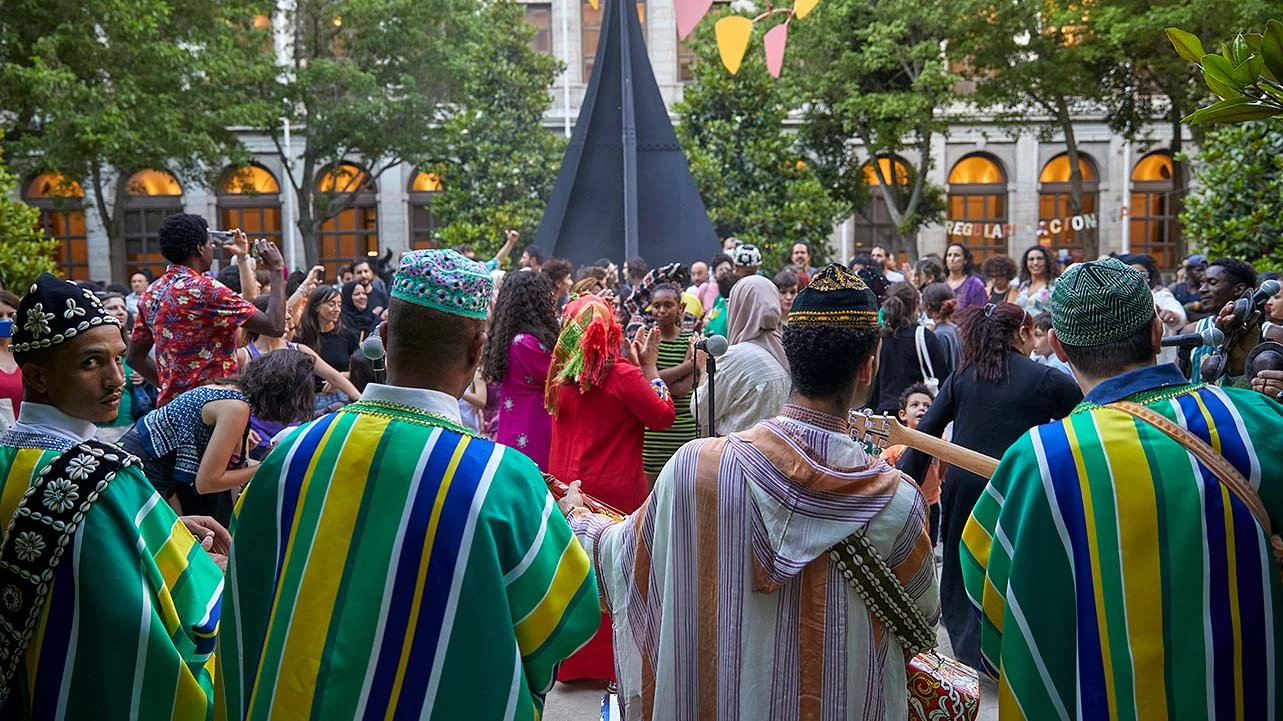
Held on 01, 02, 03, 04, 05, 06, 07, 08, 09, 10, 11, 12, 13, 14, 15, 16, 17, 18, 19, 20, 21, 22, 23, 24, 25, 26, 27, 28, 29, 30 Jun 2022
Slumil K’ajxemk’op — which means “rebel land” in Tzotzil, a Mayan dialect — is how the Zapatista delegation renamed Europe during its visit to the continent in 2021. A gift for being aware of and recognising ourselves as part of another Europe “abducted” from itself, and which invites us to reinvent our ties to the past in an emancipatory mode of expression, to the point of returning our otherness to us: the non-suppressed condition. It is a shard of glass in the fissure of selves, in the shadows of identities and commands, between fragments of experiences, spaces and languages. Slumil K’ajxemk’op arrived by boat, slowly, off time, amid a global pandemic, challenging the global logics of control over resources and bodies. It arrived negotiating borders and norms, learning other forms of encounter and relationships with otherness that is also us; a journey towards diaspora which still inhabits and unsettles us, beyond the colours and words we recall and forget how they also constitute us.
The Museo accepts this gift by organising a fourth Temporary Intensity Zone (TIZ) with a decolonial subject, through which figures and practices from the Global South converse. Thus, the programme welcomes Grupo Cultural Yuyachkani, which participates in the Aníbal Quijano Chair on decolonial thought — directed by Rita Segato and Elisa Fuenzalida — and in the Expanded Theatricalities Chair — directed by ARTEA — to engage in dialogue and reflect on the knowledge of bodies, the collective memory of their struggles and suffering, and their calls for a feminist emancipatory epistemology. By the same token, the Museo organises other activities and encounters interwoven through neighbourhoods, migrant tongues, festivals, meetings and picnics.
-
Friday, 3 June 2022 Nouvel Building, Auditorium 400
Los Voluble
’92 Ends it All
TicketsIn 1992, Spain’s institutions wanted to be modern but without shaking off the imperial past they commemorated. To fund the Barcelona Olympics and Expo ’92 in Seville, the country incurred a debt of 180 million euros with European banks, foreshadowing States’ loss of autonomy to the financial sector. Around this time, the experimental duo Los Voluble put forward an audiovisual and sound exploration which reflected on 1992 and its implications in Spain’s cultural, social and political sphere, drawing from archive material, electronic music and live cinema.
Curator: José Luis Espejo and Jesús Jara
Organised by: Museo Reina Sofía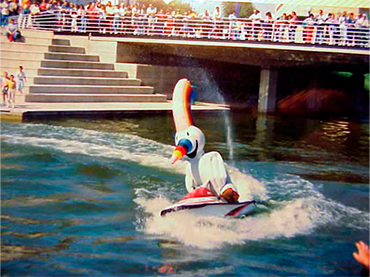
-
Saturday, 4 June 2022 Sabatini Building, main entrance and Garden
Neighbourhood Picnic
Walking Together to Make a Commons
The Neighbourhood Picnic is the chance for Lavapiés (Madrid) residents to come together in the Museo’s Garden, a place for everyone and part of the daily life of the neighbourhood in which it is situated. This year, the struggles and protests of different collectives that make up the Museo Situado network are the focus, and the aim is to grant visibility to three campaigns: #Esenciales* #RegularizacionYa (#Essential* #RegularisationNow), #Ratificacion189Ya (#Ratification189Now) and #StopExclusionSanitaria (#StopHealthExclusion).
Organised by: Museo Situado
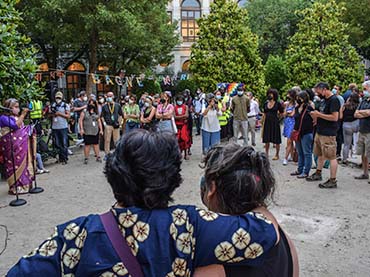
-
Thursday, 16 June 2022 Nouvel Building, Protocol Room and online platform
Situated Voices 24
Between Dreams and Deceits: Trafficking as a Form of Slavery in the 21st Century
TicketsAfter Russia’s invasion of Ukraine, the forced migration of millions of people has once again become a pressing issue that reignites the debate around human trafficking — one of the 21st century’s recurring forms of slavery — and the situations that cause it. This edition of Situated Voices turns its attentions to the urgent need to create public policies that detect, support and protect people being trafficked, suggesting the need to place this vulnerability above any immigration laws and other types of legislation.
Organised by: GRIGRI, Museo Situado and Red Solidaria de Acogida
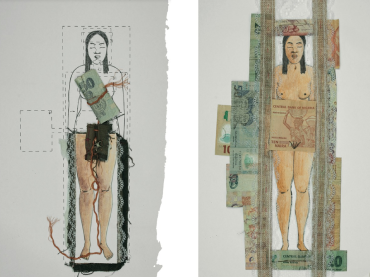
-
Saturday, 18 June 2022 Sabatini Building, Auditorium and Garden
Archipelago 2022
The Material Conditions of Our Music
TicketsStarting from the image of the ship Ever Given stranded on the Suez Canal in 2021, the sixth edition of Archipelago reflected on the material questions that influence music, for instance the transportation of raw materials and goods and the importance of ports, colonial routes and ocean currents, in addition to forced migrations. Through a string of concerts fusing traditional music and experimentation, Archipelago recapitulated, reinterpreted and overhauled learning related to the common history of traditional music to date.
Participants: Erkizia + Cantizano, Edna Martinez, Pujllay Masis, Mazaher and Mohammad Reza Mortazavi.
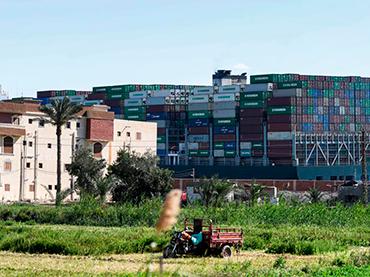
-
Tuesday, 21 June 2022 Nouvel Building, Floor 1, Room 104.06 and Room 104.07
Free Unions. Searching for a Place
Activities on the Collection
RegistrationFree Unions is a series of events, tours and activations in the rooms of Communicating Vessels. Collection 1881–2021, the new presentation of the Museo Reina Sofía Collection. This edition activates Room 104.06. Luis Camnitzer: Puerto Montt Massacre, 1969 and Room 104.07. A Map Is Not a Place. Via Grupo Cultural Yuyachkani, active since 1971 in Peru, fragments of the collective’s artistic repertoire are set in relation to the memories formalised by other artists who have confronted similar political or social situations.
Organised by: Museo Reina Sofía

-
From 21 to 25 June 2022 Nouvel Building and Online platform
The Expanded Theatricalities Chair
Yuyachkani (I Am Thinking, I Am Remembering), Memories in Action
The Expanded Theatricalities Chair analyses the thought inhabiting stage and performance practice. This second edition presents the artistic and political pathway taken by Grupo Cultural Yuyachkani. The programme gets under way with a performance action by Yuyachkani in the rooms of the Museo Reina Sofía Collection, framed inside the programme Free Unions, and continues with sessions focused on the archive of the group’s output across fifty years and on their work with the Truth and Reconciliation Commission. Moreover, one of the sessions converses with the Aníbal Quijano Chair.
Curator: ARTEA
Organised by: Museo Reina Sofía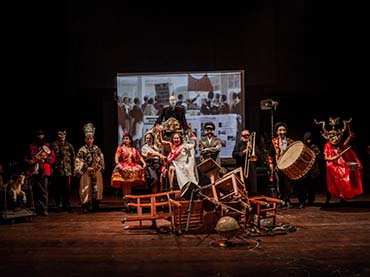
-
From 22 to 25 June 2022
The Aníbal Quijano Chair
Is Feminism with Patriarchal Episteme Possible?
The Aníbal Quijano Chair opens a channel of collective reflection-action, incorporating it into the multiple viewpoints that today find colonial modernity stripped of its primeval promises. This 2022 edition centres on examining the patriarchal epistome that becomes present in inquisitorial feminism and debates around transfeminisms. The programme starts with a seminar in which Rita Segato participates alongside local transfeminist activists, continues with a conversation between Teresa Ralli, a founder and member of Grupo Cultural Yuyachkani, and Rita Segato to set up a dialogue with the Expanded Theatricalities Chair, and ends with a public lecture by Segato.
Curators: Elisa Fuenzalida and Rita Segato
Organised by: Museo Reina Sofía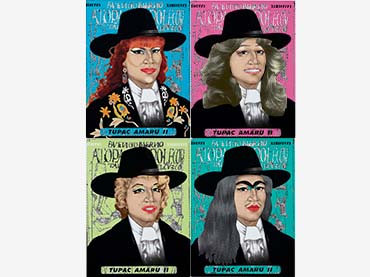
-
Monday, 27 June 2022 Nouvel Building, Auditorium 200
Art and Tourism Imaginaries IV
The Tourist City. Utopia and Dystopia
TicketsWhat desires did tourist cities have to arouse in their permanent or temporary residents? What were the architecture of pleasure promises and what pain did they open the way for? What dystopias have we inherited from the tourist utopias of the 1970s? These are the questions anchoring a session run by the research group TURICOM. The edition starts with four lectures by Eugenia Afinoguénova, Cristina Arribas, Julián Díaz Sánchez and Ramón Vicente Díaz del Campo Martín-Mantero, before moving on to a conversation between Antoni Miralda and Jordi Costa, and ending with a final debate moderated by Germán Labrador Méndez, director of the Museo Reina Sofía’s Public Activities Department.
Organised by: Museo Reina Sofía and the inter-university research group TURICOM. The Tourist Experience: Image, Body and Death
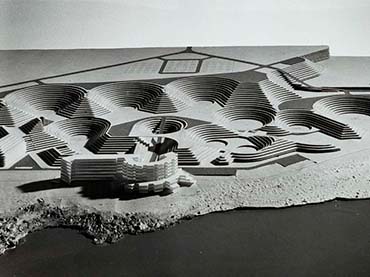
-
From 30 June to 2 July 2022 Casa Central from the University of Chile, Museo de Arte Contemporáneo (Chile), Museo de la Memoria y de los Derechos Humanos (Chile) and online platform
The Chair of Situated Thought
De-Constituent: Practices and Imaginaries to Come
Thursday 30 - Online platformThe Chair of Situated Thought seeks to propel spaces of dialogue and transmission and bring together intellectual practices on different fronts that have been emerging in Latin America. The programme places the situation extending across Chile since 2019 in dialogue, and confrontation, with other Latin American contexts, focusing on the tension between social control and revolts or social flare-ups inside the context of the COVID-19 pandemic. It also looks to grant visibility to present-day tensions and contradictions in the constituent exercise of political imagination that joins critical thought, activisms and artistic practices.
Curators: Ileana Diéguez and Ana Longoni
Organised by: Museo Reina Sofía and Universidad Autónoma Metropolitana (Campus Cuajimalpa, Mexico)
Collaboration: Universidad de Chile, Museo de Arte Contemporáneo (Chile) and Museo de la Memoria y de los Derechos Humanos (Chile)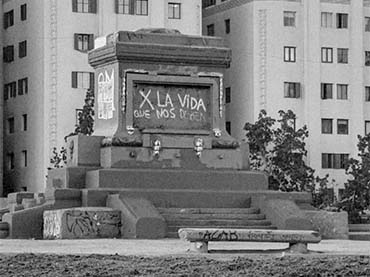
-
Episode 2. The Lost Thought Sabatini Building, Floor 4
Stateless and Natural People. Room 407
The issue of exile cannot be separated from the history of relations between Spain and Latin America, from the spectres of colony and empire. Yet exiles also enable other relationships between Spanishness and Latin Americaness to be imagined. The pieces in this room demonstrate how, for many exiles, diaspora represents a chance to question the national, historical and racial categories upon which the discourse of Hispanic identity and its origins were based. It explores a “tertiary identity”, if we return to the theory of “three Spains” with which Américo Castro revolutionised Spanish historiography. In it, when the exiled subject did not dream of being a conquistador or give themselves over to anomie, solidarity and empathy towards the earth’s condemned can be rediscovered due to their condition of being subordinate and dispossessed. Many Spanish Republicans learned to see themselves as stateless upon documenting the exclusion of Blackness and Indigenousness practiced in their societies of integration, or projected their own experience on the forms of syncretism and the resistance of these communities.
-
Episode 4. Double Exhibition: Art and Cold War Sabatini Building, Floor 4
… And Colonials, 2021. Room 422
Spain’s colonies were already scarce in the years of major European decolonisation, yet Francoism had turned the glorification of Hispanic imperial feats into one of the basic cornerstones of its rhetorical pomp. Therefore, the official propaganda in the 1950s and 1960s hammered home the representation of scenes underscoring the need to act as guardians of the colonised population, backed by “scientific” research conducted by the Institute of African Studies (IDEA), from the Spanish National Research Council (CSIC), into “the mental capacity of the black man”. Even so, the pieces in this room show how the greatest defence of a colonial world view could be carried out in a more grid-like and vague way in the fabric of daily life and the emerging consumer society: in advertising “foreign” products, in books, comics and collections of adventure stickers, and even the development of the slave monkey illustrating the first tins of Cola Cao.
-
Episode 7. Apparatus ‘92. Can History Be Rewound? Sabatini Building, Floor 0
Apparatus ‘92. Can History Be Rewound? Rooms 002.01 to 002.22
Expo ’92 in Seville, an event conceived to celebrate Spain’s definitive entry into modernity, revealed more sharply the light and darkness of the Iberian colonial legacy. Drawing from this event, Rooms 002.01 to 002.22 question the intrinsic relationship between conquest and violence, and contain spaces and themes which chime with the concept of “rebel land” articulating this fourth TIZ, for instance: the critical reinterpretation of the fifth centenary offered by Room 002.06; the question around modern-day Potosí cities in Room 002.08; the memory of the consequences of the 1884 Berlin Conference in Room 002.09; and the question concerning a “potential history” in relation to the colonial cultural pillaging offered by Ariella Aïsha Azoulay’s film Un-documented. Undoing Imperial Plunder in Room 002.18
-
Until 5 September 2022 Sabatini Building, Floor 3, Vaults Room and Garden
< Garden of Mixtures: Attempts to Make Place, 1995 -… >
Alejandra Riera
TicketsAn exhibition devoted to the work of Alejandra Riera which assays the poetic modes of making place through a recurring image in her practice: a collective canvas, which for this occasion takes the form of a garden in movement. Beyond a retrospective, the exhibition seeks to experiment with the “how” of poetically renewing via a unique and shared experience, gestures and questionings which emerge from the archives of “lieuxdétudes” (places of studies) started by the artist almost three decades ago and unfurled here. The result of individual effort and long-term commitment, these Lieuxdétudes build and sustain affective and sensitive settings, spaces for interrogation and collective breathing.
Organised by: Museo Reina Sofía
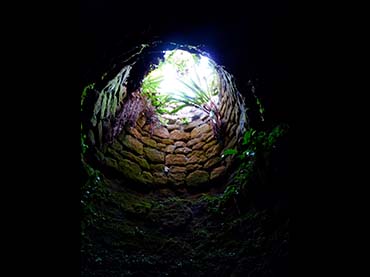
-
18 May - 10 October 2022 Sabatini Building, Floor 3
Graphic Turn
Like the Ivy on a Wall
TicketsGraphic Turn. Like the Ivy on a Wall is the outcome of a long collective research process conducted by the Southern Conceptualisms Network, in collaboration with the Museo Reina Sofía. The exhibition puts forward a survey of graphic art initiatives which have, from the 1960s to the present day, confronted urgent, politically oppressive contexts in Latin America, articulating strategies of transformation and resistance that radically changed art-making, the way in which it established intersubjective links, built communities, and even circulated graphic supports.
Curator: Southern Conceptualisms Network
Organised by: Museo Reina Sofía
With the support of: Embassy of the Argentine Republic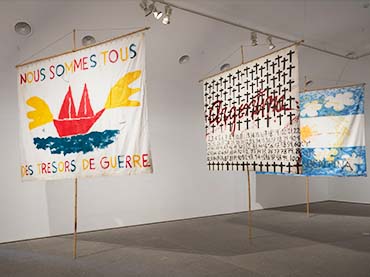
Más actividades

Difficulty. Forms and Political Effects of Deviation in Writing and Contemporary Art
23 February – 14 December 2026 – Check programme
Difficulty. Forms and Political Effects of Deviation in Writing and Contemporary Art is a study group aligned towards thinking about how certain contemporary artistic and cultural practices resist the referentiality that dominates the logics of production and the consumption of present-day art. At the centre of this proposal are the concepts of difficulty and deviation, under which it brings together any procedure capable of preventing artistic forms from being absorbed by a meaning that appears previous to and independent from its expression. By ensuring the perceptibility of their languages, difficulty invites us to think of meaning as the effect of a signifying tension; that is, as a productive and creative activity which, from the materiality of art objects, frees aesthetic experience from the representational mandate and those who participate in it from the passiveness associated with tasks of mimesis and decoding.
The economy of the referential norm translates the social logic of capitalism, where insidious forms of capturing subjectivity and meaning operate. In the early 1980s, and adopting a Marxist framework, poet Ron Silliman highlighted how this logic entailed separating language from any mark, gesture, script, form or syntax that might link it to the conditions of its production, rendering it fetichised (as if without a subject) and alienating its users in a use for which they are not responsible. This double dispossession encodes the political strategy of referential objectivity: with no subject and no trace of its own consistency, language is merely an object, that reality in which it disappears.
The political uses of referentiality, more sophisticated today than ever before, sustain the neoliberal-extractivist phase of capitalism that crosses through present-day societies politically, economically and aesthetically. Against them, fugitive artistic practices emerge which, drawing from Black and Queer studies and other subaltern critical positions, reject the objective limits of what exists, invent forms to name what lies outside what has already been named, and return to subjects the capacity to participate in processes of emission and interpretation.
Read from the standpoint of artistic work, the objective capture of referentiality may be called transparency. Viewed from a social contract that reproduces inequality in fixed identity positions, transparent in this objectivity are, precisely, the discourses that maintain the status quo of domination. Opposite the inferno of these discourses, this group aims to collectively explore, through deviant or fugitive works, the paradise of language that Monique Wittig encountered in the estranged practices of literature. For the political potency of difficulty — that is, its contribution to the utopia of a free language among equals — depends on making visible, first, its own deviations; from there, the norm that those deviations transgress; and finally, the narrowness of a norm which in no way exhausts the possibilities ofsaying, signifying, referring and producing a world.
From this denouncement of referential alienation, fetishisation and capture, Difficulty. Forms and Political Effects of Deviation in Writing and Contemporary Art turns its attention to the strategies of resistance deployed by contemporary artists and poets. Its interest is directed towards proposals as evidently difficult or evasive as those of Gertrude Stein, Lyn Hejinian, Theresa Hak Kyung Cha, Kameelah Janan Rasheed, Kathy Acker, María Salgado and Ricardo Carreira, and as seemingly simple as those of Fernanda Laguna, Felix Gonzalez Torres and Cecilia Vicuña, among other examples that can be added according to the desires and dynamics of the group.
The ten study group sessions, held between February and December, combine theoretical seminars, work with artworks from the Museo Reina Sofía’s Collections and exhibitions, reading workshops and public programs. All these formats serve as spaces of encounter to think commonly about certain problems of poetics — that is, certain political questions — of contemporary writing and art.
Difficulty. Forms and Political Effects of Deviation in Writing and Contemporary Art inaugurates the research line Goodbye, Representation, through which the Museo Reina Sofía’s Studies Directorship seeks to explore the emergence of contemporary artistic and cultural practices which move away from representation as a dominant aesthetic-political strategy and redirect their attention toward artistic languages that question the tendency to point, name and fix, advocating instead for fugitive aesthetics. Over its three-year duration, this research line materializes in study groups, seminars, screenings and other forms of public programming.

Institutional Decentralisation
Thursday, 21 May 2026 – 5:30pm
This series is organised by equipoMotor, a group of teenagers, young people and older people who have participated in the Museo Reina Sofía’s previous community education projects, and is structured around four themed blocks that pivot on the monstrous.
This fourth and final session centres on films that take the museum away from its axis and make it gaze from the edges. Pieces that work with that which is normally left out: peripheral territories, unpolished aesthetics, clumsy gestures full of intent. Instead of possessing an institutional lustre, here they are rough, precarious and strange in appearance, legitimate forms of making and showing culture. The idea is to think about what happens when central authority is displaced, when the ugly and the uncomfortable are not hidden, when they are recognised as part of the commons. Film that does not seek to be to one’s liking, but to open space and allow other ways of seeing and inhabiting the museum to enter stage.

Intergenerationality
Thursday, 9 April 2026 – 5:30pm
This series is organised by equipoMotor, a group of teenagers, young people and older people who have participated in the Museo Reina Sofía’s previous community education projects, and is structured around four themed blocks that pivot on the monstrous.
The third session gazes at film as a place from which to dismantle the idea of one sole history and one sole time. From a decolonial and queer perspective, it explores films which break the straight line of past-present-future, which mix memories, slow progress and leave space for rhythms which customarily make no room for official accounts. Here the images open cracks through which bodies, voices and affects appear, disrupting archive and questioning who narrates, and from where and for whom. The proposal is at once simple and ambitious: use film to imagine other modes of remembering, belonging and projecting futures we have not yet been able to live.

Remedios Zafra
Thursday March 19, 2026 - 19:00 h
The José Luis Brea Chair, dedicated to reflecting on the image and the epistemology of visuality in contemporary culture, opens its program with an inaugural lecture by essayist and thinker Remedios Zafra.
“That the contemporary antifeminist upsurge is constructed as an anti-intellectual drive is no coincidence; the two feed into one another. To advance a reactionary discourse that defends inequality, it is necessary to challenge gender studies and gender-equality policies, but also to devalue the very foundations of knowledge in which these have been most intensely developed over recent decades—while also undermining their institutional support: universities, art and research centers, and academic culture.
Feminism has been deeply linked to the affirmation of the most committed humanist thought. Periods of enlightenment and moments of transition toward more just social forms—sustained by education—have been when feminist demands have emerged most strongly. Awareness and achievements in equality increase when education plays a leading social role; thus, devaluing intellectual work also contributes to harming feminism, and vice versa, insofar as the bond between knowledge and feminism is not only conceptual and historical, but also intimate and political.
Today, antifeminism is used globally as the symbolic adhesive of far-right movements, in parallel with the devaluation of forms of knowledge emerging from the university and from science—mistreated by hoaxes and disinformation on social networks and through the spectacularization of life mediated by screens. These are consequences bound up with the primacy of a scopic value that for some time has been denigrating thought and positioning what is most seen as what is most valuable within the normalized mediation of technology. This inertia coexists with techno-libertarian proclamations that reactivate a patriarchy that uses the resentment of many men as a seductive and cohesive force to preserve and inflame privileges in the new world as techno-scenario.
This lecture will address this epochal context, delving into the synchronicity of these upsurges through an additional parallel between forms of patriarchal domination and techno-labor domination. A parallel in which feminism and intellectual work are both being harmed, while also sending signals that in both lie emancipatory responses to today’s reactionary turns and the neutralization of critique. This consonance would also speak to how the perverse patriarchal basis that turns women into sustainers of their own subordination finds its equivalent in the encouraged self-exploitation of cultural workers; in the legitimation of affective capital and symbolic capital as sufficient forms of payment; in the blurring of boundaries between life and work and in domestic isolation; or in the pressure to please and comply as an extended patriarchal form—today linked to the feigned enthusiasm of precarious workers, but also to technological adulation. In response to possible resistance and intellectual action, patriarchy has associated feminists with a future foretold as unhappy for them, equating “thought and consciousness” with unhappiness—where these have in fact been (and continue to be) levers of autonomy and emancipation.”
— Remedios Zafra

27th Contemporary Art Conservation Conference
Wednesday, 4, and Thursday, 5 March 2026
The 27th Contemporary Art Conservation Conference, organised by the Museo Reina Sofía’s Department of Conservation and Restoration, with the sponsorship of the Mapfre Foundation, is held on 4 and 5 March 2026. This international encounter sets out to share and debate experience and research, open new channels of study and reflect on conservation and the professional practice of restorers.
This edition will be held with in-person and online attendance formats, occurring simultaneously, via twenty-minute interventions followed by a five-minute Q&A.